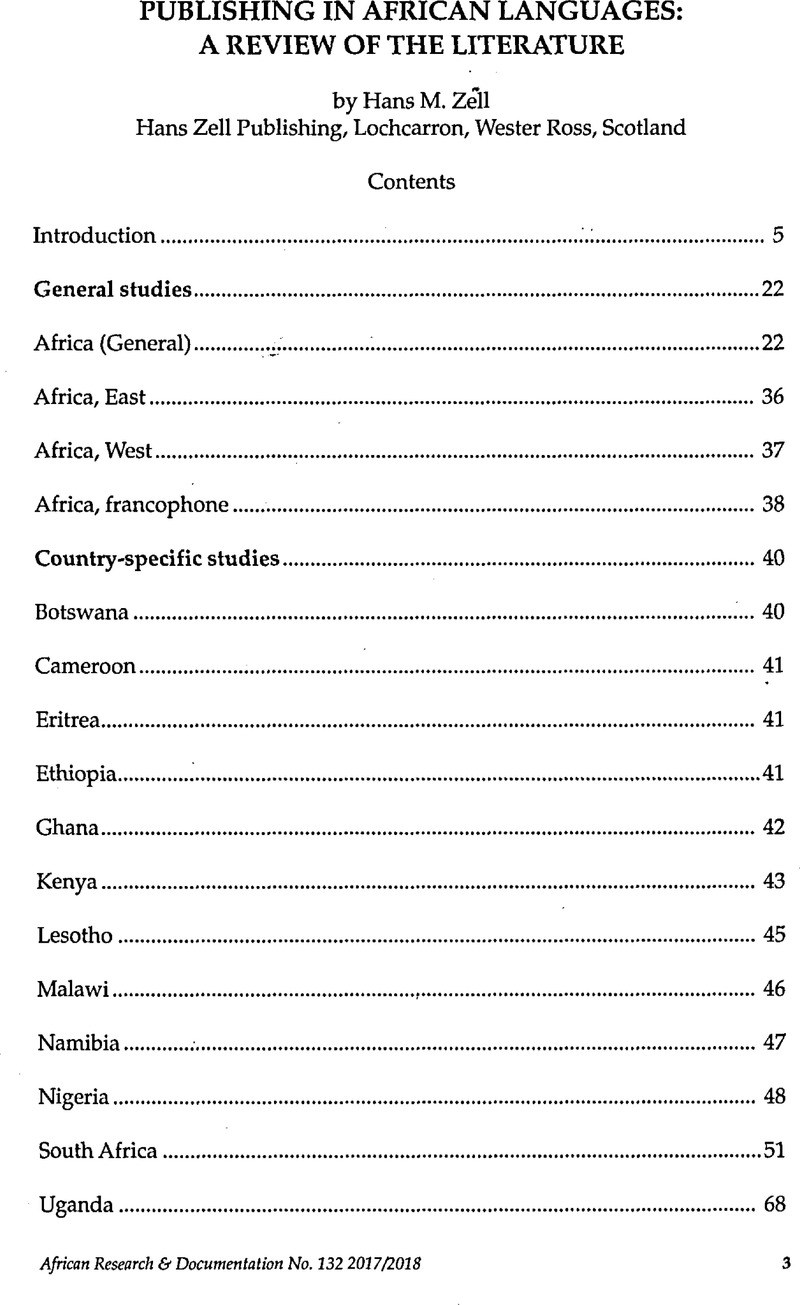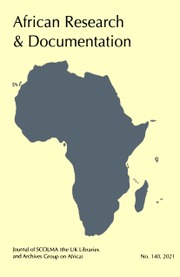Article contents
Publishing in African Languages: a review of the literature
Published online by Cambridge University Press: 25 April 2022
Abstract

- Type
- Other
- Information
- Copyright
- Copyright © International African Institute 2018
References
Notes and References
1 Ethnologue: Languages of the World, 20th edition, edited by Gary R Simons and Charles D. Fennig. Dallas, Texas: SIL International, 2017. Online version: http://www.ethnologue.com and African languages inventoried and analysed at https://www.ethnologue.com/region/Africa.
2 RTI International Survey of Children's Reading Materials in African Languages in Eleven Countries - Final Report. Washington, DC: United States Agency for International Development, Bureau for Africa, 2015. 60 pp. https://globalreadingnetwork.net/sites/default/files/eddata/Survey_of_Children%27s_Reading_Materials_in_African_Languages_in_Eleven_Countries.pdf (See full record under African language publishing for children) The survey stated: “Although materials in 200 African languages were found, most languages are represented by very few titles: 40 languages have only one title each, 42 languages have between two and five titles, and 59 languages have between six and 20 titles. The three languages with the largest number of published titles also have relatively large speaker populations: Kiswahili (808 titles for an estimated 100 million speakers across several countries), Chichewa/Nyanja (509 titles for an estimated 10 million speakers in Malawi, Zambia, and Mozambique), and Amharic (366 titles for an estimated 26 million speakers in Ethiopia).” (p. 5)
3 Zell, Hans “How Many Books are Published in Africa? The Need for More Reliable Statistics.” The African Book Publishing Record 39, no. 4 (2013): 397-406. https://www.degruyter.com/view/j/abpr-2013-39-issue-4/abpr-2013-0009/abpr-2013-0009.xml Also at (freely accessible) https://www.academia.edu/4549278/How_Many_Books_are_Published_in_Africa_The_Need_for_More_Reliable_StatisticsGoogle Scholar
4 First articulated in his classic work Decolonising the Mind: The Politics of Language in African Literature (London: Heinemann Educational Books, 1986, and several African editions), a collection of essays about language and its constructive role in national culture, history, and identity, and in which he makes a strong plea for linguistic decolonisation.
5 See for example this very interesting exchange of views: Mugane, John “Contemporary Conversations: Is English an African Language?” Journal of African Cultural Studies, 29, no. 4 (2017): 1-3. http://www.tandfonline.com/doi/pdf/10.1080/13696815.2017.1357353?needAccess=true (free access), which introduces these two articles by Ngũgĩ wa Thiong'o and Biodunjeyifo: Ngũgĩ wa Thiong'o “The Politics of Translation: Notes Towards an African Language Policy.” Journal of African Cultural Studies 29, no. 4 (2017): 1-9 http://www.tandfonline.com/doi/full/10.1080/13696815.2016.1183476 Jeyifo, Biodun “English is an African Language - Ka Dupe! [for and against Ngũgĩ].” Journal of African Cultural Studies 29, no. 4 (2017): 1-15 http://www.tandfonline.com/doi/full/10.1080/13696815.2016.1264295Google Scholar
6 For a good overview that examines the complex factors militating against the authority of African languages,_as-well as the conditions favourable to their empowerment, and the avenues that can be exploited to facilitate such empowerment, see Ayo Bamgbose “African Languages Today: The Challenge of and Prospects for Empowerment under Globalization.” In Selected Proceedings of the 40th Annual Conference on African Linguistics, edited by Eyamba G. Bokamba et al Somerville, MA: Cascadilla Proceedings Project, 2011, 1-14. http://www.lingref.com/cpp/acal/40/paper2561.pdf
7 Wolff, H. Ekkehard “How the Continent's Languages Can Unlock the Potential of Young Africans.” https://theconversation.com/how-the-continents-languages-can-unlock-thepotential-of-young-africans-90322 See also his recent article in the February 2018 issue (no. 494) of University World News, “ Africa Failing to Address Linguistic Imperialism.” http://www.universityworldnews.com/article.php?story=20180222092733807
8 For example, Irene Staunton of Weaver Press in Zimbabwe http://weaverpresszimbabwe.com/ reports: “… although we officially have a standard orthography for Shona and Ndebele, debate over regional preferences can still rage. So no matter how qualified the person might be who edits and proof-reads the text, there will always be complaints that the Ndebele is too deep or too shallow, the language includes (or doesn't) too much contemporary slang/Shinglish; or that the language is too Manyika or too Zezuru or too Karanga, etc. What is correct for person A is often incorrect for person B.” Irene Staunton, personal communication, 13 April 2018.
9 Mda, Zakes The State of a Reading/Writing Nation. Address at the Opening of the South African Book Fair, 8 September 2017. http://city-press.news24.com/Voices/we-must-create-a-culture-where-reading-in-all-languages-isrespected-20170919 (Report) https://www.scribd.com/document/359298371/South-African-Book-Fair-Keynote-Address#from_embed (Complete text of address)
10 For a wide-ranging investigation on the topic of book donation programmes see Zell, Hans M., and Raphael Thierry “Book Donation Programmes for Africa: Time for a Reappraisal? Two Perspectives.” African Research & Documentation. Journal of SCOLMA - the UK Libraries and Archives Group on Africa no. 127 (2015) [Published 2017]: 3-130 (part I), 131-220 (part II). Pre-print online versions (freely accessible) Part I: Book Donation Programmes in English-speaking Africa, by Hans M. Zell https://www.academia.edu/13165497/Book_Donation_Programmes_for_Africa_Time_for_a_Reappraisal_Part_I Part II: Le don de livre, mais a quel prix, et en echange de quoi? Un regard sur le don de livre en Afrique francophone, by Raphael Thierry (in French, with an abstract in English) at https://www.academia.edu/13166294/Le_don_de_livre_mais_%C3%A0_quel_prix_et_en_%C3%A9change_de_quoi_Book_donation_programmes_for_Africa_part_2_
11 The South African Book Development Council's Indigenous Languages Publishing Programme http://sabookcouncil.co.za/indigenous-languagespublishing-programme/ draws on funding from sources like the National Lotteries Commission and National Arts Council to implement the ILPP. Its website states that “it is currently in the process of publishing a catalogue of locally published books in all 11 of the official South African languages.” It has also organized workshops with small, medium and micro enterprises participating in the ILPP devoted to cover design and text editing, which resulted in the first-ever book on text editing in one of South Africa's major indigenous language.
12 Reprint of African Classics Project http://www.nlsa.ac.za/index.php/reprint-of-african-classics. It states “While recognising that there has been significant growth in the book sector in South Africa, publishing in indigenous African languages was virtually limited to school markets. A number of factors have been cited as causes for trie lack of audiences for books in indigenous African languages, but what was apparent, was that many South Africans had particular books in their indigenous languages that had lasting impact in them.” It was against this backdrop that in 2008 the Department of Arts and Culture entrusted the National Library of South Africa with the task to identify and reprint books regarded as literary classics in the nine South African indigenous languages. Members of the public, academics, authors and librarians were invited to nominate books that they consider classics in their respective indigenous languages. A panel of literary and publishing experts finalised the list.
13 Write/Publish/Read http://viaafrika.com/writepublishread/ and see record under South Africa.
14 Publishers’ Association of South Africa Writings in Nine Tongues. A Catalogue of Literature and Readers in Nine African Languages for South Africa. Green Point, South Africa: Publishers’ Association of South Africa, 2007. 631 pp. + CD http://www.publishsa.co.za/index.php?cmd=nineLang (Select from 9 different pdf files, by language) [not currently accessible]
15 An enquiry addressed to the Publishers Association of South Africa about availability of this publication did not elicit a response.
16 See also their presentation “The Contribution of the African Storybook Initiative to Content Development for Multilingual Literacy Development in Africa” at http://ucu.ac.ug/images/ResearcrT/Languages/ASb-Wepukhulu-Gulere-Ngasike.pdf
17 See http://www.adeanet.org/en/news/adea-usaid-global-book-alliancepartnership-time-to-eliminate-book-hunger-for-children-in. And see also this report https://www.afdb.org/en/news-and-events/adea-usaid-global-bookalliance-partnership-time-to-eliminate-book-hunger-for-children-inafrica-17848/
The workshop report and action plan, released in March 2018, can be found at http://www.adeanet.org/sites/default/files/adea_gba_workshop_report.Pdf
18 PEN International Culture's Oxygen - The PEN Report. Developing the Minority-Language Creative Writing Industry in Kenya, Haiti, Serbia, and Nigeria. An Inter-Regional Research, Advocacy and Development Programme, edited by Sarah Clarke and James Tennant. London: PEN International, 2016 [published February 2017], p. 27. https://issuu.com/peninternational/docs/oxygen_issuu
19 Publishing, Books & Reading in Sub-Saharan Africa: A Critical Bibliography (Print and online) Edited by Hans M. Zell. With an introductory essay by Henry Chakava. Lochcarron, Scotland: Hans Zell Publishing, 2008. 762 pp. Note: Online version temporarily unavailable as at May 2018. To be relaunched shortly by its new host institution in Africa, Kwara State University Library in Nigeria, on an improved digital platform (and see also http://www.hanszell.co.uk/pbrssa.htm)
20 The following annual literature reviews have been published to date: “Publishing & the Book in Africa: A Literature Review for 2017.” Pre-print online version (freely accessible) https://www.academia.edu/35877629/Publishing_and_the_Book_in_Africa_A_Literature_Review_for_2017 The African Book Publishing Record 44, no. 2 (2018), forthcoming May 2018.
“Publishing & the Book in Africa: A Literature Review for 2016.” Pre-print online version (freely accessible) https://www.academia.edu/31441110/Publishing_and_the_Book_in_Africa_A_Literature_Review_for_2016 The African Book Publishing Record 43, no. 2 (2017): 120-170. https://www.degruyter.com/view/j/abpr.2017.43.issue-2/abpr-2017-0004/abpr-2017-0004.xml?format=INT
“Publishing & the Book in Africa: A Literature Review for 2015.” Pre-print online version (freely accessible) https://www.academia.edu/20432811/Publishing_and_the_Book_in_Africa_-_A_Literature_Review_for_2015 The African Book Publishing Record 42, no. 1 (March 2016): 11-37. [Published as “Reference Resources. Publishing and the Book in Africa - A Literature Review.”] http://www.degruyter.eom/view/j/abpr.2016.42.issue-l/abpr-2016-0003/abpr-2016-0003.xml?format=INT
21 Some recent studies on publishing in African languages in francophone Africa include the following:
A good, fairly recent (April 2013, updated 13 November 2015) overview of the state of publishing in African languages in francophone Africa is L'édition en langues africaines chez les éditeurs d'Afrique francophone [Publishing in African languages among publishers in French-speaking Africa] by Danusia Richer http://mondedulivre.hypotheses.org/1607, which profiles the main publishers active in this area, and the nature of their publications. The author also reports about a number of initiatives designed to promote publishing in African languages, and looks at the challenges and opportunities to revitalise increased publishing output in national languages.
The Alliance internationale des éditeurs indépendants/The International Alliance of Independent Publishers https://www.alliance-editeurs.org/ (French) https://www.alliance-editeurs.org/?lang=en (English) has for long been supportive of publishing in local and national languages in Africa, and in others parts of the world. In October 2018 it plans to publish a special issue of its journal Bibliodiversity-Publishing and Globalisation https://www.alliance-editeurs.org/-bibliodiversity-journal,118-, which will seek to share a broad perspective of views and experiences in the publication and distribution of so-called minority languages: Écrire et publier en langues «minorées” : création et circulation des textes en contexte mondialisé [“Writing and Publishing in ‘Minority’ Languages: Creation and Circulation of Texts in a Globalised Context“] Co-ordinating Editors: Nathalie Carré & Raphaël Thierry.
Also useful is an earlier report about a meeting in 2013 hosted by the Alliance internationale des éditeurs indépendants, “L'édition en langues locales et nationales: quelles opportunités pour l'édition en Afrique ?” [Publishing in Local and National languages: What Opportunities for Publishing in Africa?] Atelier des Assises intemationales de l'édition indépendante, pour faire vivre et renforcer ensemble la bibliodiversité 11-13 juin 2013, Ouagadougou, Burkina Faso https://www.alliance-editeurs.org/IMG/pdf/premieres_conclusions_atelier_langues_africaines_assises_2013_et_2014-2.pdf
An important very recent contribution, edited by Guinean publisher Aliou Sow, is Les défis de la promotion et de la distribution des livres en langues africaines, Actes du Colloque Conakry, 27 au 28 novembre 2017- INRAP, Donka. [The Challenges of Promoting and Distributing Books in African Languages. Proceedings of the Conakry Symposium, 27-28 November 2017 - INRAP, Donka]
Conakry: Les Éditions Ganndal, 2017. 24 pp. https://www.alliance-editeurs.org/IMG/pdf/actes_du_colloque_langues_africaines_web_conakry_nov._2017.pdf
In January 2018 a high level technical meeting held in Abidjan, organized by the Global Book Alliance (GBA) and the Association for the Development of Education in Africa (ADEA)'s Working Group on Books and Learning Materials (WGBLM) in collaboration with the United States Agency for International Development (USAID), “developed a common draft action plan around five pillars for advocating and establishing innovative and effective mechanisms within countries for the production, acquisition, distribution, management and use of textbooks and other reading materials in national languages.” See http://www.adeanet.org/en/news/adea-usaid-global-bookalliance-partnership-time-to-eliminate-book-hunger-for-children-in. The workshop report and action plan was published on 29 March 2018 and is freely accessible at http://www.adeanet.org/sites/default/files/adea_gba_workshop_report.pdf. (also available in a French version)
22 This edition published as Publishing and Book Development in Sub-Saharan Africa. An Annotated Bibliography, by Hans M. Zell & Cécile Lomer. London: Hans Zell Publishers (Hans Zell Studies on Publishing, 3), 1996. 409 pp. Published in association with the African Publishers’ Network (APNET), Harare, Zimbabwe.
- 2
- Cited by




